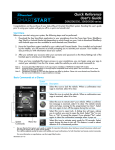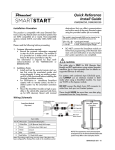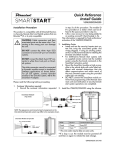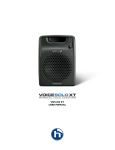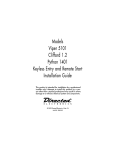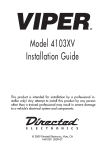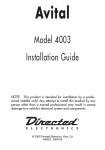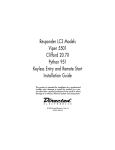Download Directed Electronics Smart start Install guide
Transcript
Quick Reference Install Guide VSM200/250, DSM200/250 in step 5a of this procedure. The module ID # is provided on a sticker which can be affixed to the space provided in step 5a. • Is this a new account or one being added to an existing account? Check box(es) in 5a. This information is required for final verification/activation of the VSM200/250 or DSM200/250. Installation Procedure This product is compatible with all Directed Electronics Security, Remote Start and hybrid systems that are ESP2 compatible (3 or 4-pin). CAUTIONS The white plug is ONLY for RSR (Remote Start Ready) applications For systems with combined 4-pin ESP/D2D ports, you CANNOT use an interface module in D2D mode when using a SmartStart module. You must use W2W on the bypass module There should NEVER be more than one data plug connected from the 3-way harness DO NOT cut any of the loops on the SmartStart Module (unless used for RSR applications) DO NOT connect the black 3-pin ESP connector to white Door Lock port on Directed systems Please read the following before proceeding 1. Customer Information required: • Record the customer information requested 2. Installation Points: • Install and test the security/remote start system first using the associated guides and wiring diagram. If using an existing system, verify it is fully functional before installing the Directed SmartStart module. • For 3000-series Remote Start systems with no supplied remote control, test the installed system using the functional commands in the SmartStart activation portal. • Mount the SmartStart module as high as possible in the vehicle (side with color label and model number facing down). Mount with minimal obstructions that can affect communications and within reach of the main Directed system using the provided cables (do not extend). • DO NOT connect the SmartStart module until the final programming of the Remote Start main unit and verification of security/remote start system operations are completed. Wiring Schematic SmartStart Module (Top view) Directed System (Top view) ESP (4 pin, brn) 4 pin ESP (3 pin, blk) LED 2 pin Fuse D2D (4 pin, wht) +12V GND NOTE: The appearance and connector/port arrangement on the Directed/Avital/Xpresskit system may differ to the examples shown . CPU1 Signal Strength (RSSI) The module's signal strength (RSSI) can be viewed in the activation portal after a successful transmission test. This field is displayed on the webpage as "RSSI: XX dB" with XX being the numeric variable. Use the range guide (at right) to determine the signal strength. Monitor this signal during installation to ensure the device is mounted in a location which maximizes signal strength with minimal interference. GPS location accuracy should also be checked on the activation portal when activating DSM/VSM250 modules. SmartStart to signal Xpresskit -50 to -90 dB Module = good strength -91 to -100 dB = borderline/inconsistent signal strength (see table) > -100 dB ✂ cut loop = weak, insufficient signal strength 4 pin D2D QRNDSM250 2011-05 (4 pin, white) 2 pin +12V GND 3. Install the VSM200/250 or DSM200/250 using the information in the wiring diagram and steps (Note CAUTIONS during installation). a. Complete the main power connections. b. Connect the 4-pin extension cable to the SmartStart module cable. c. Connect the interface cable to the extension cable and the other appropriate end into the Bitwriter port of the Directed system. d. When power is connected, the module begins an initialization procedure that may take several minutes. During this procedure, progress is reported via the flashing Amber/ Green LEDs next to the module cable. When both LEDs turn on solid, the initialization procedure is completed (See Status LEDs for a description of the various LED states). Note: If the system does not include a remote control, skip step 4 and proceed to step 5. 4. Re-verify security/remote start system operation: Perform all basic operations such as Lock, Unlock, Panic and Remote Start, (Trunk release where applicable) using the supplied remote control. If the system operates as expected proceed to the next step (5). If the system does not operate as expected, rectify the problem first. 5. Verify and Activate the SmartStart module: The following steps need to be performed for the Verification/Activation of the Directed SmartStart module. a. Collect Customer Information: Customer's Full Name: Customer's E-mail Address: Customer's mobile phone # and phone carrier Record/place Module ID # here: b. Log on to: www.directechs.com, and click on the SmartStart link. c. Follow the on-screen directions to activate and test a SmartStart device. If this is the customer's first SmartStart system, you will be prompted to enter their information as collected in step 5a. d. Test the SmartStart system from the website using the supplied function links. e. The customer is sent log-in information for the new Customer Service Portal via e-mail. From there, they must provide the required information. Once completed, the installed system and account are activated. The customer can then open the phone app and begin using the service. Status LEDs Amber LED states: • Off: No cellular communication. Check connections such as module harness. • Flashing slowly: The module is seeking cellular system communication. If no cell coverage is available the Amber LED continues to flash slowly, move the vehicle to a location with better reception. • Flashing quickly: The module is negotiating with a cellular system. • On solid: Communication successfully established. Green LED states: • Off: Communication not established with the remote start main unit. Check connection at the Bitwriter port, once connected properly the LED turns on. • Flashing: Active communication in progress between the SmartStart module and Remote Start main unit. • On solid: Communication successfully established with the remote start main unit. Please return this guide and point the customer to step 5e after successfully completing the installation as it contains details required for account setup. Notes: SmartStart response time can vary depending on cellular coverage and network congestion. Operating temperature range: -30°C to + 70°C. Directed Logo Usage New Account: Existing Account: If this is an existing account, are you: adding a new system: or replacing an existing one: Logo, Directed with designed in USA.eps Additional information can be found at: www.directechs.com Logo, Directed Electronics w-driven.eps 2 © 2011 Directed Electronics. All rights reserved. Logo, Directed with Distributed By.eps




